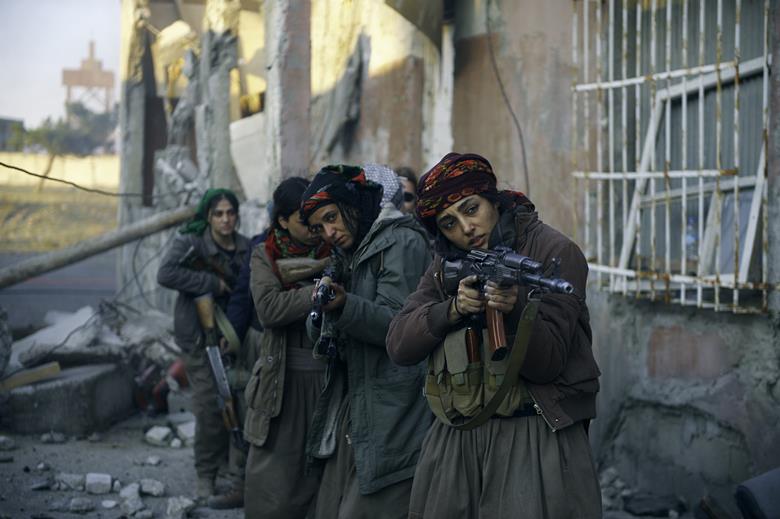American conservatives don’t usually like Marxist guerrillas, but they make an exception for the Kurds. So do American socialists. The further left you go, the more you feel the burn of contempt for the Kurds, until eventually you go far enough left to find yourself in the company of those who support the Kurds’ enemies.
Our friends on the left have principles, you know. It isn’t sufficient to survive genocidal attacks and build a gender-neutral people’s militia. You have to hate America and Israel too. A bit of Islamist zealotry doesn’t go amiss either, for the decadent Western nostril is happy to mistake the stink of Islamism for the red rose of socialism. This is why Ilhan Omar and Rashida Tlaib can’t bring themselves to squeeze out a whisper of support for the Kurds, despite most of them being Sunni Muslims. It is also why no one on the left bothers to ask them to do so.
Was the Syrian Civil War our era’s equivalent of the Spanish Civil War? If it was, it doesn’t reflect well on the left. In the Thirties, socialists from all over the US and Europe volunteered to fight in Spain. In recent years, Islamists from all over the world volunteered to fight in Syria, including an estimated 300 from the US. While the genocide of the Yazidis was going on in Syria, the American left indulged itself in bizarre fantasies about Israel committing genocide against the Palestinians, and American policemen committing genocide against black people. While women and children were forced into sexual slavery in Syria, the American left was complaining about gender-neutral bathrooms.
Girls of the Sun is directed by Eva Husson, the granddaughter of a Republican who fought in the Spanish Civil War. Her film is based on the true story of the Yazidi women from the Sinjar province of Syria who in 2014 survived the massacre of their men and the abduction of their children, then escaped from sexual enslavement in the Islamic State, and formed all-female Syrian Kurdish militia units. Girls of the Sun received good reviews at Cannes last year, but has had universally mediocre reviews from American critics.
Jeanette Katsoulis of the New York Times calls Girls of the Sun ‘weak and often corny’. Christy Lemire on Roger Ebert’s site calls it ‘treacly melodrama’ and finds the character development ‘woefully lacking to the point of empty cliché’. Perhaps Christy Lemire mistakes the thousand-yard stares of PTSD victims for a lack of actorly commitment. Perhaps the reviewers are jaded, or just woefully disconnected from real life. Perhaps, as Christy Lemire admits, the whole topic is just ‘too complicated, too far away’. I found Girls of the Sun flawed by some bad directorial decisions, but also gripping, appalling and inspiring.
Bahar (Golshifteh Farahani) is the commandeer of a female platoon, dug in on a hill overlooking her ISIS-controlled home town. Flashbacks narrate the ISIS raid on their town, the killing of the men, the kidnapping of the young boys, including Bahar’s son; the rape and enslavement of women and girls as young as nine; the suicide of her sister after being raped by a jihadist; and her escape from imprisonment. Bahar believes that her young son is still alive, and in his school, which has been turned into a ‘lion cub’ training camp for the brainwashing of juvenile Islamists. She wants to attack now, but her commander must wait for American air support.
The director, Eva Husson, handles all of this candidly. Matthias Thoelstrup’s wintry cinematography — the mountains of Georgia standing in for the real thing — is wonderful. But Husson weakens the film through two evasions of reality. One is the presence of French journalist Mathilde (Emmanuelle Bercot), who gets in the way of the camera without adding much. Worse, Mathilde’s claim to be an authentic witness is mocked by her unfortunate and contrived resemblance to the late Marie Colvin. Mathilde too was at the media center in Homs when it was targeted by Assad’s artillery, except that she lost an eye, not her life. Perhaps the makers of Girls of the Sun thought this imposture was a way of interesting the provincial audiences of Europe and the US. Perhaps, given how distant and difficult the Kurdish struggle for freedom is among the people who should be its loudest supporters, they were right.
The other problem is the music. Husson has said that she filmed the women dancing to Kurdish techno, which sounds promising, but chose to dub on some sad and rather French synths. The effect isn’t corny, so much as obstructive. The same goes for the final voice over from Mathilde, which sounds great in French but reads as romantic slop in the subtitles. Girls of the Sun doesn’t have a set-up: it has a predicament, and the women’s performances are uncomfortably emotional. The sloppy synths and silly eyepatch are unnecessary complications, and they distance the drama. Husson has second-guessed the chronic provinciality of the largest market for her film. The dim responses from the American critics shows that her assessment was right, but her responses were wrong.
Still, as I said, Girls of the Sun is worth watching. The sophisticates at the New York Times may feel that Husson is ‘more interested in exalting her subjects than humanizing them’, but when was the last time the Times got anything right about the Middle East? People who have fought back after dehumanizing loss and abuse, and who have offered their lives to recover their homes, should be exalted. Unless, of course, they ally themselves with the United States.
Dominic Green is Life & Arts Editor of Spectator USA.


















